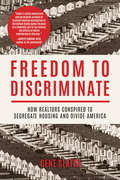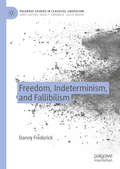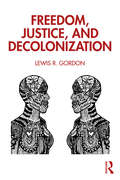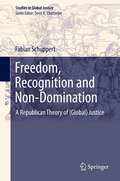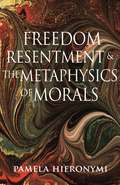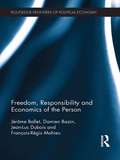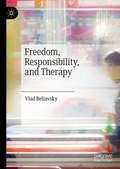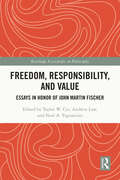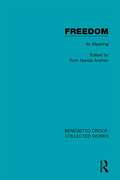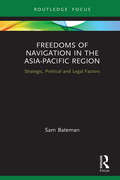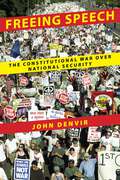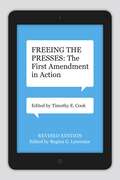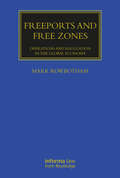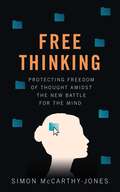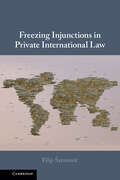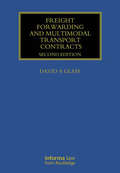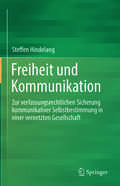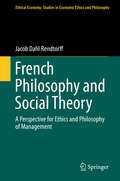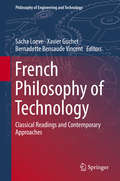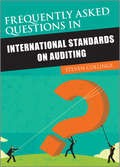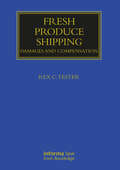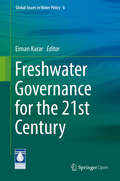- Table View
- List View
Freedom to Discriminate: How Realtors Conspired to Segregate Housing and Divide America
by Gene SlaterA landmark history told with supreme narrative skill, Freedom to Discriminate uncovers realtors’ definitive role in segregating America and shaping modern conservative thought. Gene Slater follows this story from inside the realtor profession, drawing on many industry documents that have remained unexamined until now. His book traces the increasingly aggressive ways realtors justified their practices, how they successfully weaponized the word &“freedom&” for their cause, and how conservative politicians have drawn directly from realtors’ rhetoric for the past several decades. Much of this story takes place in California, and Slater demonstrates why one of the very first all-white neighborhoods was in Berkeley, and why the state was the perfect place for Ronald Reagan’s political ascension. The hinge point in this history is Proposition 14, a largely forgotten but monumentally important 1964 ballot initiative. Created and promoted by California realtors, the proposition sought to uphold housing discrimination permanently in the state’s constitution, and a vast majority of Californians voted for it. This vote had explosive consequences—ones that still inform our deepest political divisions today—and a true reckoning with the history of American racism requires a closer look at the events leading up to it. Freedom to Discriminate shatters preconceptions about American segregation, and it connects many seemingly disparate aspects of the nation’s history in a novel and galvanizing way.
Freedom, Indeterminism, and Fallibilism (Palgrave Studies in Classical Liberalism)
by Danny FrederickThis book uses the concepts of freedom, indeterminism, and fallibilism to solve, in a unified way, problems of free will, knowledge, reasoning, rationality, personhood, ethics and politics. Presenting an overarching theory of human freedom, Frederick argues for an account of free will as the capacity for undetermined acts. Knowledge, rationality, and reasoning, both theoretical and practical, as well as personhood, morality and political authority, are all shown to be dependent at their roots on indeterminism and fallibility, and to be connected to individual freedom. Thought-provoking and original, Frederick’s theory of freedom examines a broad spectrum of issues, from the distinction between persons and other animals, to the purpose of the state and political authority. Offering a bold and succinct conspectus of the philosophy of freedom, this book makes surprising connections between perennial issues across the field of philosophy.
Freedom, Justice, and Decolonization
by Lewis R. GordonThe eminent scholar Lewis R. Gordon offers a probing meditation on freedom, justice, and decolonization. What is there to be understood and done when it is evident that the search for justice, which dominates social and political philosophy of the North, is an insufficient approach for the achievements of dignity, freedom, liberation, and revolution? Gordon takes the reader on a journey as he interrogates a trail from colonized philosophy to re-imagining liberation and revolution to critical challenges raised by Afropessimism, theodicy, and looming catastrophe. He offers not forecast and foreclosure but instead an urgent call for dignifying and urgent acts of political commitment. Such movements take the form of examining what philosophy means in Africana philosophy, liberation in decolonial thought, and the decolonization of justice and normative life. Gordon issues a critique of the obstacles to cultivating emancipatory politics, challenging reductionist forms of thought that proffer harm and suffering as conditions of political appearance and the valorization of nonhuman being. He asserts instead emancipatory considerations for occluded forms of life and the irreplaceability of existence in the face of catastrophe and ruin, and he concludes, through a discussion with the Circassian philosopher and decolonial theorist, Madina Tlostanova, with the project of shifting the geography of reason.
Freedom, Recognition and Non-Domination: A Republican Theory of (Global) Justice
by Fabian SchuppertThis book offers an original account of a distinctly republican theory of social and global justice. The book starts by exploring the nature and value of Hegelian recognition theory. It shows the importance of that theory for grounding a normative account of free and autonomous agency. It is this normative account of free agency which provides the groundwork for a republican conception of social and global justice, based on the core-ideas of freedom as non-domination and autonomy as non-alienation. As the author argues, republicans should endorse a sufficientarian account of social justice, which focuses on the nature of social relationships and their effects on people's ability to act freely and realize their fundamental interests. On the global level, the book argues for the cosmopolitan extension of the republican principles of non-domination and non-alienation within a multi-level democratic system. In so doing, the book addresses a major gap in the existing literature, presenting an original theory of justice, which combines Hegelian recognition theory and republican ideas of freedom, and applying this hybrid theory to the global domain.
Freedom, Repression, and Private Property in Russia
by Vladimir Shlapentokh Anna ArutunyanThis study demonstrates how the emergence of private property and a market economy after the Soviet Union's collapse enabled a degree of freedom while simultaneously supporting authoritarianism. Based on case studies, Vladimir Shlapentokh and Anna Arutunyan analyze how private property and free markets spawn feudal elements in society. These elements are so strong in post-Communist Russia that they prevent the formation of a true democratic society, while making it impossible to return to totalitarianism. The authors describe the resulting Russian society as having three types of social organization: authoritarian, feudal, and liberal. The authors examine the adaptation of Soviet-era institutions like security forces, police, and the army to free market conditions and how they generated corruption; the belief that the KGB was relatively free from corruption; how large property holdings merge with power and necessitate repression; and how property relations affect government management and suppression.
Freedom, Resentment, and the Metaphysics of Morals (Princeton Monographs in Philosophy #46)
by Pamela HieronymiAn innovative reassessment of philosopher P. F. Strawson's influential "Freedom and Resentment"P. F. Strawson was one of the most important philosophers of the twentieth century, and his 1962 paper "Freedom and Resentment" is one of the most influential in modern moral philosophy, prompting responses across multiple disciplines, from psychology to sociology. In Freedom, Resentment, and the Metaphysics of Morals, Pamela Hieronymi closely reexamines Strawson's paper and concludes that his argument has been underestimated and misunderstood.Line by line, Hieronymi carefully untangles the complex strands of Strawson's ideas. After elucidating his conception of moral responsibility and his division between "reactive" and "objective" responses to the actions and attitudes of others, Hieronymi turns to his central argument. Strawson argues that, because determinism is an entirely general thesis, true of everyone at all times, its truth does not undermine moral responsibility. Hieronymi finds the two common interpretations of this argument, "the simple Humean interpretation" and "the broadly Wittgensteinian interpretation," both deficient. Drawing on Strawson's wider work in logic, philosophy of language, and metaphysics, Hieronymi concludes that his argument rests on an implicit, and previously overlooked, metaphysics of morals, one grounded in Strawson's "social naturalism." In the final chapter, she defends this naturalistic picture against objections.Rigorous, concise, and insightful, Freedom, Resentment, and the Metaphysics of Morals sheds new light on Strawson's thinking and has profound implications for future work on free will, moral responsibility, and metaethics.The book also features the complete text of Strawson's "Freedom and Resentment."
Freedom, Responsibility and Economics of the Person (Routledge Frontiers of Political Economy #175)
by Jérôme Ballet Damien Bazin Jean-Luc Dubois François-Régis MahieuThe capability approach has developed significantly since Amartya Sen was awarded the Nobel Prize in Economics in 1998. It is now recognised as being highly beneficial in the analysis of poverty and inequality, but also in the redefinition of policies aimed at improving the well-being of individuals. The approach has been applied within numerous sectors, from health and education to sustainable development, but beyond the obvious interest that it represents for the classical economics tradition, it has also encountered certain limitations. While acknowledging the undeniable progress that the approach has made in renewing the thinking on the development and well-being of a population, this book takes a critical stance. It focuses particularly on the approach’s inadequacy vis-à-vis the continental phenomenological tradition and draws conclusions about the economic analysis of development. In a more specific sense, it highlights the fact that the approach is too bound by standard economic logic, which has prevented it from taking account of a key ‘person’ dimension — namely, the ability of an individual to assume responsibility. As a result, this book advocates the notion that if the approach is used carelessly in relation to development policies, it can cause a number of pernicious effects, some of which may lead to disastrous consequences. Due to its multidisciplinary nature, this book will be of interest to those working in the fields of economics, philosophy, development studies and sociology.
Freedom, Responsibility, and Therapy
by Vlad BeliavskyThis book investigates the role of free will and responsibility in mental well-being, psychotherapy, and personality theory. Mounting evidence suggests that a belief in free will is associated with positive outcomes for human mental health and behaviours, yet little is known about why the theme of freedom has such a significant impact. This book explores why and how different freedom-related concepts affect well-being and psychotherapy, such as autonomy, free will, negative freedom, the experience of freedom, blame, and responsibility.Through the lens of the works of Freud and Rogers, the book tackles both theoretical and practical questions: How can different senses of responsibility affect mental health? What are the implications of a lack of free will for therapy? If we have no free will, can therapists continue to encourage their clients to take responsibility for their actions? Is it possible to reconcile different counselling schools concerning free will? With an illuminating dive into both philosophy and psychotherapy, Beliavsky carefully analyses the implications of the philosophical free will debate on therapy and shows that some senses of freedom and responsibility are crucial to psychotherapy and mental health.
Freedom, Responsibility, and Value: Essays in Honor of John Martin Fischer (Routledge Festschrifts in Philosophy)
by Neal A. Tognazzini Taylor W. Cyr Andrew LawThis volume celebrates the career of John Martin Fischer, whose work on a wide range of topics over the past 40 years has been transformative and inspirational. Fischer’s semicompatibilist view of free will and moral responsibility is perhaps the most widely discussed view of its kind, and his emphasis on the significance of reasons-responsiveness as the capacity that underlies moral accountability has been widely influential. Aside from free will and moral responsibility, Fischer is also well-known for his work on freedom and foreknowledge, the problem of evil, the badness of death, the meaning of life, and the allure of immortality. This volume gathers new essays by leading scholars on some of the major themes of Fischer's work, and it also includes a new piece by Fischer in which he offers a systematic reflection on and defense of the motivations that have shaped his theorizing about moral responsibility. Freedom, Responsibility, and Value will be of interest to scholars and students working on a variety of issues in metaphysics, ethics, and philosophy of religion.
Freedom: Its Meaning (Collected Works)
by Ruth Nanda AnshenOriginally published in 1942 this book brings together contribution from some of the finest thinkers and philosophers of the 20th century such as Boas, Croce, Einstein, Haldane, Mann, and Russell. The volume discusses the problem of Freedom from diverse points of view and offers a synthesis of issues and conclusions relating to freedom as a basis for action with a view to try and fill the gaps existent in the study of the nature of Man.
Freedoms of Navigation in the Asia-Pacific Region: Strategic, Political and Legal Factors (Routledge Research on the Law of the Sea)
by Sam BatemanThe need for freedoms of navigation in regional waters is frequently mentioned in statements from regional forums, but a common understanding of what constitutes a particular freedom of navigation or the relevant law is lacking. This book discusses how law, politics and strategy intersect to provide different perspectives of freedoms on navigation in the Asia-Pacific region. These freedoms are very important in this distinctively maritime region, but problems arise over interpreting the navigational regimes under the law of the sea, especially with regard to the rights of foreign warships to transit another country’s territorial sea without prior notification or authorisation of the coastal state, and with determining the availability of high seas freedoms of navigation and overflight in an exclusive economic zone. The book explores these issues, referring in particular to the position of the main protagonists on these issues in Asian waters – the United States and China – with their strongly opposing views. The book concludes with a discussion of the prospects for either resolving these different perspectives or for developing confidence-building measures that would reduce the risks of maritime incidents. Providing a comprehensive yet concise overview of the various different factors affecting freedom of navigation, this book will be a valuable resource for those working or studying in the fields of international relations, maritime security and the law of the sea.
Freedom’s Edge
by Frank S. RavitchFreedom's Edge takes the reader directly into the heart of the debate over the relationship between religious freedom and LGBT and reproductive rights. The book explains these complex areas of law, and what is at stake in the battle to protect each of these rights. The book argues that religious freedom and sexual freedom share some common elements and that in most contexts it is possible to protect both. Freedom's Edge explains why this is so, and provides a roadmap for finding common ground and maximizing freedoms on both sides. The book will enable anyone with an interest in these issues to understand what the law actually teaches us about religious freedom, sexual freedom, and how they interact. This is important because what is often argued by partisans on both sides distorts the legal and cultural stakes, and diminishes the possibility of compromise.
Freeing Speech: The Constitutional War over National Security
by John DenvirThe United States is in the midst of a heated conversation over how the Constitution impacts national security. In a traditional reading of the document, America uses military force only after a full and informed national debate. However, modern presidents have had unparalleled access to the media as well as control over the information most relevant to these debates, which jeopardizes the abilities of a democracy’s citizens to fully participate in the discussion. In Freeing Speech, John Denvir targets this issue of presidential dominance and proposes an ambitious solution: a First Amendment that makes sure the voices of opposition are heard.Denvir argues that the First Amendment’s goal is to protect the entire structure of democratic debate, even including activities ancillary to the dissemination of speech itself. Assessing the right of political association, the use of public streets and parks for political demonstrations, the press’ ability to comment on public issues, and presidential speech on national security, Denvir examines why this democratic model of free speech is essential at all times, but especially during the War on Terror.
Freeing the Presses: The First Amendment in Action (Media & Public Affairs)
by Regina G. Lawrence Timothy E. Cook"A thoughtful, provocative, and timely account of the meaning of a free press in the United States." -- American Journal of Political ScienceMost Americans consider a free press essential to democratic society -- -either as an independent watchdog against governmental abuse of power or as a wide-open marketplace of ideas. But few understand that far--reaching public policies have shaped the news citizens receive. With contributions from leading scholars in the fields of history, legal scholarship, political science, and communications, this revised and updated edition of Freeing the Presses offers an in-depth inquiry into the theory and practice of journalistic freedom. In addition to a new foreword by Regina G. Lawrence and afterword by Laura Stein, Freeing the Presses presents fresh and timely analyses of the complexities of news media and politics.
Freeports and Free Zones: Operations and Regulation in the Global Economy (Maritime and Transport Law Library)
by Mark RowbothamThis book explains the definition, concepts, practices and procedures of Free Zone operations; how they are created, how they operate, and their benefits to the global and national economy. Readers will be able to understand why Free Zones exist, their role in the development and maintenance of international trade, and how they contribute to national and global economic development and wellbeing, especially in developing nations. The author explains the processes in the establishment of Free Zones, and how government legislation and initiatives assist in this process. The book comprehensively but accessibly covers the topics of Freeports, Free Zones, Export Processing Zones (EPZs) and Special Economoic Zones (SEZs), as well as issues such as Customs requirements, Free Zone law and government initiatives, including the new UK Freeport initiative. It analyses the role of such Zones in global economic development and considers the challenges and issues related to Free Zone development and operation, including security and potential crime. The book also provides a series of case studies into selected global examples of Free Zones, EPZs and SEZs. Freeports and Free Zones will have a broad readership, being of interest to global economic, fiscal and government institutions, policymakers, legal practitioners and advisers, economic and business advisers, port and airport authorities and major multinational enterprises. It will be especially relevant to the food, automotive, defence, manufacturing, logistics, Fast Moving Consumer Goods (FMCG), pharmaceutical, aviation and maritime industries.
Freethinking: Protecting Freedom of Thought Amidst the New Battle for the Mind
by Simon McCarthy-JonesScientific advances and new technologies are letting others manipulate our minds more easily than ever before. Now, those tasked with protecting our minds are finally preparing to fight back. As we speak, the United Nations is seeking to pin down a concrete right to free thought and enshrine it in international law alongside life, education and protest. But what is thought? And what makes it free? And how can it best be protected? Freethinking explores what an effective right to freedom of thought would look like, and asks how we might build a culture of free thought, and whether that&’s even what we want. In an uncertain and rapidly evolving world, Freethinking shows that there are solutions to the forces buffeting our minds.
Freezing Injunctions in Private International Law
by Filip ŠaranovićThe extent of available pre-judgment asset preservation relief is widely regarded as a unique characteristic of English law and one of the key factors attracting international commercial litigation to the English courts. By taking a novel view of the theoretical foundations of a freezing injunction, this book challenges the long-established view that such an injunction is an in personam form of relief whose sole purpose is to prevent unscrupulous defendants from making themselves judgment-proof. Dr Šaranović combines historical and comparative perspectives to identify several theoretical flaws in the court's jurisdiction to grant this popular form of interim relief. The book demonstrates that the current application of private international law rules in this field leads to inequality among litigants and illegitimate encroachment upon the sovereignty of foreign states. It proposes a range of possible solutions to alleviate concerns about the scope of freezing injunctions both in the domestic and international arena.
Freight Forwarding and Multi Modal Transport Contracts (Maritime and Transport Law Library)
by David GlassFreight Forwarding and Multimodal Transport Contracts, 2nd Edition, is a comprehensive guide to the law in relation to contract forms and terms created by operators, trade associations or international bodies such as the UN and used as a basis for trading conditions by freight forwarders, logistics suppliers, combined or multimodal transport operators and container operators. This second edition examines the latest editions of contract forms and terms, both where their object is the supply or procurement of multimodal carriage, as well as where they are directed to the use of combined transport equipment (ie containers, swap bodies). Of particular prominence will be a detailed examination of the latest versions of conditions used by the principal UK forwarding, logistics, intermodal and container operators such as the British International Freight Association (BIFA) conditions 2005A and the current Freightliner Conditions as well as updates on many of the conditions in use and legal developments relevant to them, eg Road Haulage Association Conditions 2009, Maersk Conditions of Carriage, TT Club Conditions.
Freiheit und Kommunikation: Zur verfassungsrechtlichen Sicherung kommunikativer Selbstbestimmung in einer vernetzten Gesellschaft
by Steffen HindelangDieses Buch gibt Antworten darauf, wie in Zeiten von Facebook und Fake News der verfassungsrechtliche Schutz des freien öffentlichen Diskurses gelingen kann. Es untersucht, wie die Verfassung auf einen nicht mehr nur durch Rundfunk und Presse klassischen Zuschnitts, sondern auch durch eine Vielzahl Einzelner organisierten massenmedialen Diskurs reagiert und wie das Verständnis der den Diskurs prägenden verfassungsrechtlichen Bausteine aktualisiert werden kann.Die technischen und wirtschaftlichen Bedingungen massenmedialer Kommunikation haben sich fundamental gewandelt. Das vorherrschende verfassungsdogmatische Schutzkonzept – ein „Ersatzmodell von Freiheit“ – kann diesem Wandel nicht ausreichend Rechnung tragen. Der Einzelne muss heute nicht mehr nur vor, sondern auch in seiner Medienmacht geschützt werden. Ausgehend von kommunikationswissenschaftlichen Erkenntnissen wird ein verfassungsrechtliches Verständnis entwickelt, das den Einzelnen wieder ins Zentrum eines freien massenmedialen Diskurses rückt.
French Philosophy and Social Theory
by Jacob Dahl RendtorffThis book demonstrates how the conceptual resources of contemporary French philosophy from the early 20thCentury to the present day can be applied to give us new perspectives on business ethics and the ethics of organizations. In providing an overview of possible applications, the book covers a wide range of philosophers, philosophical movements and perspectives and provides detailed analyses of core materials relevant to business ethics. It explores and analyzes French philosophy, taking into account phenomenology, existentialism, French epistemology, structuralism, post-structuralism, deconstruction and postmodernism as well as recent discussions of philosophy of organizations and management. Each chapter contains suggestions for further reading and educational illustrations of possible applications to the mainstream business ethics and ethics of organization literature.
French Philosophy of Technology: Classical Readings And Contemporary Approaches (Philosophy Of Engineering And Technology Ser. #29)
by Sacha Loeve Xavier Guchet Bernadette Bensaude VincentOffering an overall insight into the French tradition of philosophy of technology, this volume is meant to make French-speaking contributions more accessible to the international philosophical community. The first section, “Negotiating a Cultural Heritage,” presents a number of leading 20th century philosophical figures (from Bergson and Canguilhem to Simondon, Dagognet or Ellul) and intellectual movements (from Personalism to French Cybernetics and political ecology) that help shape philosophy of technology in the Francophone area, and feed into contemporary debates (ecology of technology, politics of technology, game studies). The second section, “Coining and Reconfiguring Technoscience,” traces the genealogy of this controversial concept and discusses its meanings and relevance. A third section, “Revisiting Anthropological Categories,” focuses on the relationships of technology with the natural and the human worlds from various perspectives that include anthropotechnology, Anthropocene, technological and vital norms and temporalities. The final section, “Innovating in Ethics, Design and Aesthetics,” brings together contributions that draw on various French traditions to afford fresh insights on ethics of technology, philosophy of design, techno-aesthetics and digital studies. The contributions in this volume are vivid and rich in original approaches that can spur exchanges and debates with other philosophical traditions.
Frequently Asked Questions in International Standards on Auditing
by Steven CollingsAuditing has hit the headlines over recent years, and for all the wrong reasons, and in today's environment, the result of negligent auditing can be serious resulting in sizeable fines and even withdrawal of audit registration which can be costly in terms of fee income.Frequently Asked Questions in International Standards on Auditing presents the relevant standards in a concise and jargon-free way, enabling auditors to appreciate the reasoning behind the standards and undertake audit work effectively. This book focuses on the main areas of the auditing standards and also addresses some key areas where audit firms are failing and which have been flagged up by audit regulators. The FAQs cover the main parts of each standard, and each question will be answered in a practical context, with worked examples showing how the standards are applied in real situations.
Fresh Kills (The Cass Jameson Mysteries #3)
by Carolyn WheatWracked by guilt, Cass searches for a young mother&’s killer On the western edge of Staten Island, not far from the city dump, lies a watery patch of earth known as Fresh Kills. It&’s an old Dutch name, and it has nothing to do with violence—until now. A defense lawyer in private practice, Cass lets a friend talk her into handling something she wouldn&’t normally touch: an adoption case. It was meant to be open and shut, but it gets messy when the mother, Amber, decides to keep the child—a decision that will mean her death. She is found facedown in the mud of Fresh Kills, and Cass Jameson can&’t help but feel that it is all her fault. To wash her hands of guilt, Cass must find Amber&’s killer, a search that will take her into a brutal part of the underworld, where children are just another commodity to be bought and sold.
Fresh Produce Shipping: Damages and Compensation (Maritime and Transport Law Library)
by Rex C. TesterThis book is an in-depth study of air and ocean goods-in-transit claims. It sets out to guide and assist businesses within the fresh produce industry to successfully implement the best processes and procedures to maximise their recovery efforts against contracted carriers. Fresh Produce Shipping focuses heavily on protecting the rights and recovery aspects of companies involved in growing, selling, and transporting fresh produce. It gives importers, exporters, loss adjusters, surveyors, and freight forwarders an easy-to-understand guide to the management and requirements of submitting claims. It provides an overview of the shipping terms and procedures involved when raising a claim. The book offers specific and detailed industry knowledge to stakeholders who would not normally have access to such information without the employment of specialists or legal counsel, providing an inexperienced reader with the tools to submit a claim and achieve an understanding of protocol. A valuable guide and comprehensive reference for parties seeking compensation for lost or damaged goods, this book will be of relevance to shippers and importers of fresh produce, lawyers acting for commercial clients and underwriters, cargo surveyors, trade bodies around the world representing fresh produce operators, and forwarders wishing to support their clients.
Freshwater Governance for the 21st Century
by Eiman KararThe objective of this book is to broadly illustrate the key aspects of water governance, mapping the spectrum of decision-making from techno-centric and eco-centric approaches, to hybrid concepts and people-centric approaches. Topics covered include the challenges for water-governance models, the polycentric model, the integration challenge, water in the decision-making hierarchy, and the rise of water-sensitive design, while also taking into account interdependencies between stakeholders, as well as the issue of scale. The book's content is presented in an integrated and comprehensive format, building on detailed case studies from around the world and the authors' working experiences in the water sector. Combining essential insights with accessible, non-technical language, it offers a valuable resource for academics, technicians and policy-makers alike.
